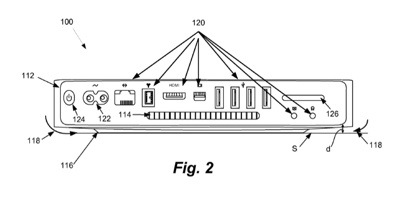Apple has filed a patent at the U.S. Patent & Trademark Office for the design of the Mac mini. Patent number 20120106067 is for a small form factor desktop computer.
An “aesthetically pleasing small form factor desktop computer” is described. The small form factor desktop computer can be formed of a single piece seamless housing that in the described embodiment is machined from a single billet of aluminum. The single piece seamless housing includes an aesthetically pleasing foot support having at least a portion formed of RF transparent material that provides easy user access to selected internal components as well as offers electromagnetic (EM) shielding.
According to Apple, this simplicity of design can accrue many advantages to the small form factor desktop computer besides those related to aesthetic look and feel. Fewer components and less time and effort can be required for assembly of the small form factor desktop computer and the absence of seams in the single piece housing can provide good protection against environmental contamination of internal components as well as EM shielding.
The inventors are Chiew-Siang Goh, Joseph B. Moak, Matthew S. Theobald, Houtan R. Farahani, Ricardo A. Mariano and Eric A. Knopf.
Other patents also appearing today at the U.S. Patent & Trademark Office include:
° Patent number 20120105348 for techniques for interactive input to portable electronic devices. Per the patent, an input surface area receives input for multiple applications including interactive applications. The input received is directed to the appropriate application based on one or more locations of the input area effectively identified when input is received. The inventors are Michael D. Lampell, Francois-Yves Bertrand, Alan Berfield, Leo Lee and Eric Snider.
° Patent number 20120105672 for systems, methods, and a computer readable medium for performing an improved blowout prevention process in an image capture device are provided to compensate for occurrences of exposure “blowouts,” i.e., areas in a captured image where pixel brightness exceeds the sensor’s dynamic range of capturing capability. Frank Doepke and Ralph Brunner are the inventors.
° Patent number 20120104543 is for high-speed memory systems that consume a reduced amount of board space, have a low height or profile, or both. Erik James Shahoian is the inventor.
° Patent number 20120105162 involves a system which starts up and shuts down a resonant oscillator circuit. During start up, the system operates a driving circuit, which is external to the resonant oscillator circuit, wherein the driving circuit uses a first clock signal to control a first phase output of the resonant oscillator circuit. The inventors are Catherine S. Chou, William C. Athas, and Heather R. Sullens.
° Patent number 20120106018 is for a spark gap for high-speed cable connectors. It involves circuits, methods, and apparatus that may provide low-capacitance protection from electrostatic discharges. The inventors are Erik James Shahohian and Vince Duperron.
° Patent number 20120109967 involves methods for prefix indexing. According to one aspect of the invention, in response to one or more terms to be indexed, each of the terms is indexed in a regular index. In addition, for each of the terms having multiple characters, at least one prefix portion of the term is indexed in a prefix index, where the regular index is used for regular searches and the prefix index is used for prefix searches without having to combine a plurality of postings lists of the regular index at the point in time. John M. Hornkvist and Eric R. Koebler are the inventors.
° Patent number 20120109970 is for methods for indexing and searching based on language locale. ohn M. Hornkvist and Eric R. Koebler are the inventors.
° Patent number 2012010323 involves methods for processing private metadata. According to one aspect of the invention, a file received from a first user is stored in a storage device, where the file includes private metadata encrypted by a secret key associated with a second user. A private metadata identifier is stored in a predetermined storage location, indicating that private metadata of the file has not been decrypted and indexed. In response to an inquiry subsequently received from the second user, the predetermined storage location is scanned to identify the private metadata identifier based on the inquiry. The encrypted metadata identified by the private metadata identifier is transmitted to the second user for decryption. In response to the metadata that has been decrypted by the second user, the decrypted metadata is indexed for the purpose of subsequent searches of at least one of the metadata and the file. The inventors are Kaelin L. Colclasure, John M. Hornkvist and Braden J. Thomas.

